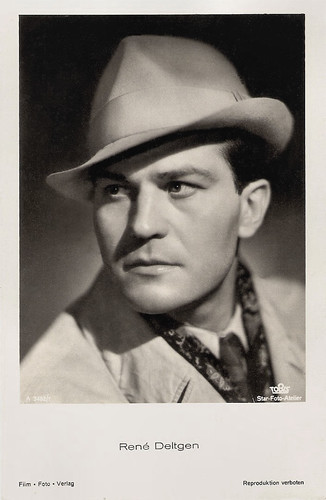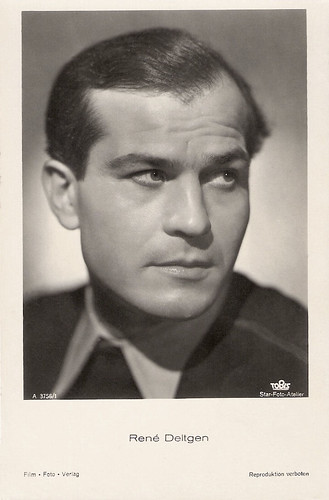
German postcard by Film-Foto-Verlag, no. A 3482/1, 1941-1944. Photo: Star-Foto Atelier / Tobis.

German postcard by Film-Foto-Verlag, no. A 3578/1, 1941-1944. Photo: Binz / Bavaria Filmkunst.

German postcard by Ross-Verlag, no. A 3009/1, 1941-1944. Photo: Baumann / Ufa.
Vigorous daredevil
Renatus Heinrich Deltgen was born in Esch-sur-Alzette, Luxembourg, in 1909. From 1927 he attended the Schauspielschule Köln (the acting school in Cologne) and there he learned to speak the German language accentless. From 1929 on he got regular engagements at the city theaters in Cologne and Frankfurt a.M.
The actor Eugen Klöpfer brought him to Berlin where he soon became a popular actor in classical productions at the Volksbühne and other theatres. Deltgen made his film debut with Das Mädchen Johanna/Joan the Maid (Gustav Ucicky, 1935). His attractive appearance and his intensive performance soon led to hero roles in action and adventure films like Kautschuk/The Green Hell (Arthur Maria Rabenalt, 1938) with Gustav Diessl.
In her study 'Nazi cinema as enchantment: the politics of entertainment in the Third Reich' (2004), Mary-Elizabeth O'Brien wrote: “Kautschuk tells the story of how the British broke the Brazilian monopoly on natural rubber (caoutchouc) and contains many hallmarks of German adventure films of the late 1930s. (…) Kautschuk was marketed as a sensational and historically accurate portrayal of one man’s heroical battle to win natural resources for his country.”
By the time Deltgen starred in Kautschuk, he had already become a star as the ‘vigorous daredevil’, a maverick who went after whatever he wanted and teetered on the edge of death. He played a spy who met his heroic death with a smile in Port Arthur (Nicolas Farkas, 1936) with Adolf Wohlbrück aka Anton Walbrook, and Achtung Feind hört mit!/Beware! The Enemy Is Listening! (Arthur Maria Rabbenalt, 1940).
He played a fortune hunter in Kongo-Express/Congo Express (Eduard von Borsody, 1939) and Brand im Ozean/Fire on the Ocean (Günther Rittau, 1939), and a courageous soldier in Urlaub auf Ehrenwort/Furlough on Word of Honor (Karl Ritter, 1937) and Fronttheater (Arthur Maria Rabbenalt, 1942). Deltgen’s roles called for a combination of strength, daring and self-sacrifice, which made him a highly sympathetic and representative hero of Nazi Cinema.

German postcard by Film-Foto-Verlag, no. A 3756/1, 1941-1944. Photo: Star-Foto Atelier / Tobis.

German postcard by Film-Foto-Verlag, no. A 3482/2, 1941-1944. Photo: Bavaria Filmkunst.
Staatsschauspieler
René Deltgen was a popular star of the Third Reich and he enjoyed official support. At the ceremonies surrounding Adolph Hitler’s fiftieth birthday in 1939, the führer honoured Deltgen with the title of 'Staatsschauspieler' (National Actor).
Besides his action roles, he could play other characters now and then. In the crime drama Die drei Codonas/The Three Codonas (Arthur Maria Rabenalt, 1940), he was an artist who was broken by his conflicts, in Das grosse Spiel/The Big Game (Robert A. Stemmle, 1942), he played a soccer player and in Wen die Götter lieben/The Mozart Story (1942, Karl Hartl), he impersonated Ludwig van Beethoven with Hans Holt as Wolfgang Amadeus Mozart.
After the war, René Deltgen first had to earn his living as a chef de cuisine and as a horse trainer at a circus for the time being. When he teamed up with actor Karl John for a cabaret show he could work on stage again and he performed for the allied troops. Engagements at the Stadttheater in Konstanz (Constance) in 1946 and the Städtischen Bühnen in Köln (Cologne) in 1947 followed before he was offered a film role again in 1949.
He played the inwardly torn actor Stefan Gorgas in Nachtwache/Keepers of the Night (Harald Braun, 1949) starring Luise Ullrich and Hans Nielsen. Nachtwache was the winner of the Golden Palm Award at the Cannes Film Festival.
This part was followed by the melodrama Tromba/Tromba, the Tiger Man (Helmut Weiss, 1949) with Angelika Hauff, in which he played a circus tiger trainer, who utilises hypnotism to keep his beasts in line, and this works so well that he also begins mesmerising women to do his bidding.

German postcard by Film-Foto-Verlag, no. A 3106/2, 1941-1944. Photo: Baumann / UFA.

German postcard by Kunst und Bild, Berlin, no. V 323. Photo: CCC-Film / Herzog-Film / A. Grimm. Publicity still for Hotel Adlon (Josef von Báky, 1955).
Brutal, cynical go-getter
René Deltgen played many successful film parts during the 1950s. He appeared as the Soviet secret agent officer Kazanow opposite Ivan Desny in Weg ohne Umkehr/No Way Back (Victor Vicas, Beate von Molo, 1953), which won the Bundesfilmpreis 1953 and a Golden Globe Award as Best Foreign Film. He also appeared as Fürst Ramigani in Fritz Lang’s double films Der Tiger von Eschnapur/The Tiger of Eschnapur (1959) and Das indische Grabmal/The Indian Tomb (1959). In these films, he played once more the earlier cliché role of a brutal, cynical go-getter.
Among his other films were Das letzte Rezept/Desires (Rolf Hansen, 1952), Unter den tausend Laternen/Under Thousand Lanterns (Erich Engel, 1952) with Michel Auclair, Der letzte Sommer/The Last Summer (Harald Braun, 1954) starring Hardy Krüger, and the drama Hotel Adlon (Josef von Báky, 1955).
During the 1960s he also often worked for television and he became a household name as detective Paul Temple in a radio series, based on the crime novels by Francis Durbridge. His films of the 1960s include the title role in the Edgar Wallace Krimi Der Hexer/The Wizard (Alfred Vohrer, 1964), the jungle adventure Die goldene Göttin vom Rio Beni/Golden Goddess of Rio Beni (Franz Eichhorn, Eugenio Martín, 1964) starring Pierre Brice, and the sequel Neues vom Hexer/The return of the Hexer (Alfred Vohrer, 1965).
During the next decade followed such films as Ohrfeigen/Slap in the Face (Rolf Thiele, 1970) with Curd Jürgens, Mein Onkel Benjamin/My Uncle Benjamin (Thomas Engel, 1973), the TV film Trotski in Coyoacan (Rolf Busch, 1974), Gefundenes Fressen/Scrounged Meals (Michael Verhoeven, 1977) with Heinz Rühmann, and the children’s film and TV series Heidi/Heidi in the Mountains (Louis Elman, Tony Flaadt, Joachim Hess, 1978), as the kind grandfather.
One of his last roles was in the excellent psychological drama Schwarz und Weiss wie Tage und Naechte/Black and White Like Day and Night (Wolfgang Petersen, 1978), about the obsessions of a man, played by Bruno Ganz, who will do almost anything to avoid losing a chess game. In 1978 René Deltgen received the Filmband in Gold for his long-standing and exceptional contribution to German cinema. A year later, he died of cancer in Cologne, Germany, in 1979. He had been married to actress Elisabeth Scherer. They were divorced and had four children. In 2004 writer-director Michael Wenk made the documentary René Deltgen - Der sanfte Rebell/René Deltgen – The Gentle Rebel (2004) for the Luxembourg television.
Scene from the TV film Der Kommissar: Die Nacht mit Lansky/The Inspector: The Night With Lansky (1974) with Eckart Dux. Source: Stimmenjäger (YouTube).
End-leader of the TV series Heidi/Heidi in the Mountains (1978). Source: MichaMuc (YouTube).
Sources: Mary-Elizabeth O'Brien (Nazi cinema as enchantment: the politics of entertainment in the Third Reich), Thomas Staedeli (Cyranos), Filmportal, AllMovie, Wikipedia (German) and IMDb.
This post was last updated on 15 December 2023.
No comments:
Post a Comment